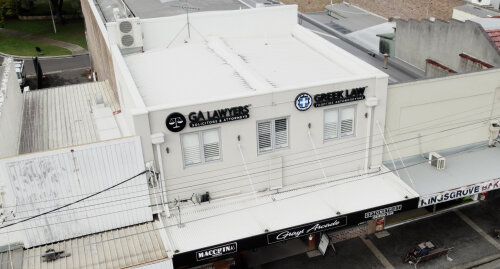Best Bad Faith Insurance Lawyers in Sydney
Share your needs with us, get contacted by law firms.
Free. Takes 2 min.
List of the best lawyers in Sydney, Australia
About Bad Faith Insurance Law in Sydney, Australia
Bad faith insurance refers to a scenario where an insurance provider fails to fulfill its contractual obligations, either by refusing to pay a legitimate claim or by mishandling an insurance claim. In Sydney, Australia, insurance companies are expected to act in good faith and conduct their businesses ethically and transparently. Bad faith insurance becomes relevant when these expectations are not met, leading insured individuals to seek legal recourse to address wrongdoings that have prevented them from receiving rightful compensation or coverage under their insurance policies.
Why You May Need a Lawyer
There are numerous situations where individuals might require the help of a lawyer in cases of bad faith insurance. Some common scenarios include: experiencing unexplained delays in claim processing, outright denial of a valid insurance claim without a reasonable basis, receiving substantially lower settlements than what is deserved, or facing any form of coercive or unfair tactics employed by the insurance company. In these cases, a lawyer can help navigate the complex legal landscape, ensure compliance with local laws, and work towards achieving a fair outcome for the insured party.
Local Laws Overview
In Sydney, Australia, several key legal principles apply to bad faith insurance cases. The Insurance Contracts Act 1984 is central, requiring insurers to act with utmost good faith. Additionally, the Australian Competition and Consumer Commission (ACCC) oversees compliance with the Competition and Consumer Act 2010, which prohibits unfair practices. Insurers are required to adhere to the General Insurance Code of Practice, which lays out standards for service and claims handling. Understanding these laws is vital in establishing a case of bad faith against an insurer.
Frequently Asked Questions
What constitutes bad faith insurance in Sydney?
Bad faith insurance includes actions such as unjustified denial of claims, undue delays, lowballing settlements, and any unethical behavior that violates the principles of good faith and fair dealing.
How can I prove an insurance company acted in bad faith?
To prove bad faith, evidence must show that the insurer's actions were unreasonable or without proper cause. This may include documentation of the lack of communication, unjustified delays, or any discrepancies in the insurer’s handling of your claim.
What are my legal options if I suspect bad faith insurance practices?
If you suspect bad faith practices, it’s advisable to consult a legal professional who can evaluate your case, help gather evidence, and possibly pursue legal action against the insurer.
Are there time limits for bringing a bad faith insurance claim?
Yes, there are statutory limitations that apply. It’s crucial to act swiftly and seek legal advice to ensure you file any claims within the required timeframe under applicable laws.
Can I handle a bad faith insurance claim on my own?
While it is possible to handle the claim on your own, due to the complexity of insurance laws and the resources of insurance companies, it might be advantageous to seek the counsel of an experienced lawyer.
What kind of compensation can I seek in a bad faith claim?
Compensation could include the original claim amount, consequential damages, legal fees, and in some instances, punitive damages to penalize the insurer for egregious conduct.
How long does it take to resolve a bad faith insurance claim?
The time frame varies depending on the complexity of the case, the evidence available, and the willingness of the insurer to settle. Cases can take from several months to a few years.
Can my insurance policy affect the outcome of a bad faith claim?
Yes, the terms and conditions outlined in your insurance policy play a critical role in determining the legitimacy and outcome of a bad faith claim.
What should I do immediately if I suspect bad faith practices?
Document everything related to your claim, including communications with the insurance company, and seek advice from a legal professional to evaluate your situation.
Are there any governmental bodies overseeing insurance practices in Australia?
The Australian Prudential Regulation Authority (APRA) and the Australian Securities and Investments Commission (ASIC) are key regulatory bodies overseeing insurance practices and compliance with laws.
Additional Resources
Several resources can assist individuals dealing with bad faith insurance issues in Sydney. The Financial Ombudsman Service offers dispute resolution services. The General Insurance Code of Practice provides guidelines and benchmarks for acceptable industry standards. Government bodies like APRA and ASIC are also instrumental in addressing grievances against insurers. Legal Aid NSW can supply advice for those in need of legal assistance but unable to afford it.
Next Steps
If you require legal assistance regarding bad faith insurance, the first step is to gather all the relevant documentation pertaining to your claim. Contact a legal professional specializing in insurance law to discuss your concerns and explore your options. Be sure to understand your insurance policy thoroughly, and remain proactive in communication with your insurer. Utilizing free resources like the Financial Ombudsman Service for preliminary advice and assistance is also beneficial. Remember, timely legal intervention can significantly influence the outcome of your case.
Lawzana helps you find the best lawyers and law firms in Sydney through a curated and pre-screened list of qualified legal professionals. Our platform offers rankings and detailed profiles of attorneys and law firms, allowing you to compare based on practice areas, including Bad Faith Insurance, experience, and client feedback.
Each profile includes a description of the firm's areas of practice, client reviews, team members and partners, year of establishment, spoken languages, office locations, contact information, social media presence, and any published articles or resources. Most firms on our platform speak English and are experienced in both local and international legal matters.
Get a quote from top-rated law firms in Sydney, Australia — quickly, securely, and without unnecessary hassle.
Disclaimer:
The information provided on this page is for general informational purposes only and does not constitute legal advice. While we strive to ensure the accuracy and relevance of the content, legal information may change over time, and interpretations of the law can vary. You should always consult with a qualified legal professional for advice specific to your situation.
We disclaim all liability for actions taken or not taken based on the content of this page. If you believe any information is incorrect or outdated, please contact us, and we will review and update it where appropriate.










